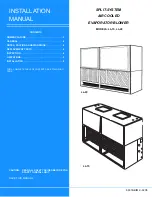
20
OFF-SEASON STORAGE
If the snow thrower will not be used for 30 days or longer, or if it is the end of the snow season when the last possibility of snow is gone, the equipment needs to be stored
properly. Follow storage instructions below to ensure top performance from the snow thrower for many more years.
Preparing Engine
Engines stored over 30 days need to be drained of fuel to prevent deterioration and
gum from forming in fuel system or on essential carburetor parts. If the gasoline in
your engine deteriorates during storage, you may need to have the carburetor, and
other fuel system components, serviced or replaced.
1.
Remove all fuel from tank by running engine until it stops. Do not attempt to
pour fuel from the engine.
2.
Change the engine oil.
3.
Remove spark plug and pour approximately 1 oz. (30 ml) of clean engine oil
into the cylinder. Pull the recoil starter several times to distribute the oil, and
reinstall the spark plug.
4.
Clean debris from around engine, and under, around, and behind muffler.
Apply a light film of oil on any areas that are susceptible to rust.
5.
Store in a clean, dry and well ventilated area away from any appliance that
operates with a flame or pilot light, such as a furnace, water heater, or
clothes dryer. Avoid any area with a spark producing electric motor, or where
power tools are operated.
WARNING
Never store snow thrower with fuel in tank indoors or in poorly ventilated
areas, where fuel fumes may reach an open flame, spark or pilot light as on
a furnace, water heater, clothes dryer or gas appliance.
6.
If possible, avoid storage areas with high humidity.
7.
Keep the engine level in storage. Tilting can cause fuel or oil leakage.
Preparing Snow Thrower
•
When storing the snow thrower in an unventilated or metal storage shed,
care should be taken to rustproof the equipment. Using a light oil or silicone,
coat the equipment, especially any chains, springs, bearings and cables.
•
Remove all dirt from exterior of engine and equipment.
•
Follow lubrication recommendations.
•
Store equipment in a clean, dry area.
•
Inflate the tires to the maximum PSI. Refer to tire sidewall.
















































